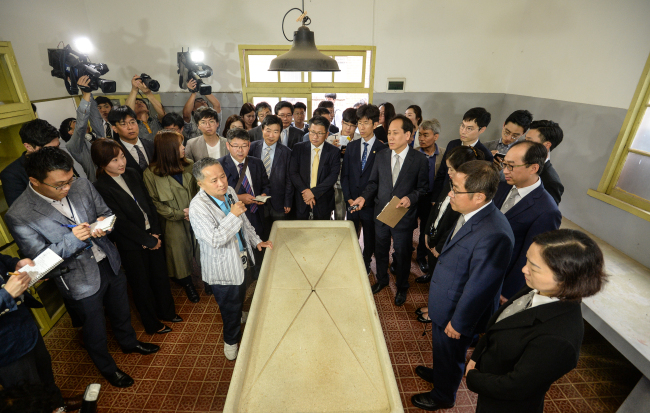GOHEUNG, South Jeolla Province -- The South Korean appeals court visited Sorokdo Island on Monday to hear a case involving people with Hansen disease who were allegedly forced to undergo sterilizations and abortions by the government.
In a compensation suit filed against the government by 139 leprosy patients, judges from the Seoul High Court traveled to the island off the southern coast to conduct an on-site inspection and hear the victims and witnesses testify.
The courtroom temporarily set up on the second floor of the Sorokdo National Hospital in Goheung County, South Jeolla Province, was packed with some 90 patients, their families and spectators mostly in their 70s and 80s.
A 74-year-old plaintiff, surnamed Jeon, testified that medical staff at the state-run hospital forced her to undergo an abortion in 1965.
“I got pregnant at the age of 23 while secretly dating my husband at the hospital. When hospital staff found out that I was pregnant, I was stripped off of my clothes and had no choice but to remove the child so as not to be kicked out of the facility and to marry my husband,” said Jeon, who was sent to the leper island at 17.
“I was given no medication or treatment after I received the operation without anesthesia. I lost so much blood.”
Sorokdo Island became a destination for Hansen disease patients in 1916 under the Japanese colonial rule. The patients were segregated and forced to undergo abortions and sterilization until the 1990s, based on the belief that the disease could be passed on to the children. But the disease is only mildly contagious and is curable.
In 1935, sterilization and abortion operations became a precondition by law for marriage and cohabitation between male and female leprosy patients.
Nam Jae-kwon, a 74-year-old ex-leper and resident of the Sorokdo Island, had to see his wife receive abortion at a different hospital in Jeonju only for them to be able to get married.
“Did we have a choice? No. I was not able to marry my wife until I showed medical staff proof that she had the surgery,” Nam, who was taken to the island at the age of 13, told The Korea Herald in front of the hospital.
“It is not a matter of money. We want the government to admit its wrongdoing and restore our honor.”
The hearing comes a year after the lower court ordered the government to pay between 30 million to 40 million won in compensation to the leprosy patients who alleged the state-led abuses on the island and at other medical facilities.
It marks the first time for judges to visit what has become known as “a leper colony” since Hansen disease’s patients first filed a compensation suit against the government in 2011. Now, a total of 539 victims are involved in five suits pending at the court.
“The nation violated individuals’ privacy, rights to pursue happiness, start families and protect their bodies,” the court said in the ruling, acknowledging the state’s responsibility for forced abortions and sterilizations.
But the government appealed the decision, saying that it did not force the patients to undergo such operations.
Kim In-kwon, a director of Yeosu Aeyang Hospital, who looked after Hansen’s patients for 30 years, took the stand as a witness to back the government’s claim.
“I have never heard or seen any abuses on leprosy patients while working at the Aeyang Hospital since 1962,” said Kim. “Frankly, there was not the manpower, legal grounds or budget to allow the patients to give birth to babies. We only conducted the sterilization surgeries on those who agreed to them.”
“The lives of the leprosy patients would have been more difficult if they had refused the surgery and lived outside the hospital. I only did what I thought was right for the patients,” he said. “It is not right to judge what was done by modern-day standards.”
Park Jong-myeong, who represents the government at the court, maintained that the surgeries were not forcibly performed.
“The accused (medical staff at the state-led hospital) are in fact those who have looked after the leprosy patients for their whole lives,” he said. “The sterilization and abortions were encouraged as part of the nationwide drive for birth control.”
Later in the day, judges examined the facilities where leprosy patients were detained. Dead bodies were dissected and abortions and sterilizations were conducted.
Lee Nam-cheol, a Hansen disease’s patient, guided the judges, lawyers and reporters around key spots on the island for about an hour to help them better understand the Hansen disease patients’ suffering.
“It is a little bit scary. ... We don’t come here often because you know ... it brings back the painful memories,” Lee said, shivering in the drizzling rain.
Now, leprosy patients are granted 150,000 won every month in living and medical expenses regardless of their income in accordance with a revised act to support leprosy sufferers.
Park Young-rib, a chief lawyer representing leprosy patients, called on the government to admit to its illegal acts of forcible abortion and sterilization to heal the wounds of the patients.
“Through this suit, we would like to sound an alarm to society to prevent a recurrence of the government’s illegal acts.”
By Ock Hyun-ju (
laeticia.ock@heraldcorp.com)








![[Today’s K-pop] Blackpink’s Jennie, Lisa invited to Coachella as solo acts](http://res.heraldm.com/phpwas/restmb_idxmake.php?idx=644&simg=/content/image/2024/11/21/20241121050099_0.jpg)